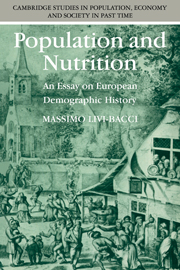Book contents
- Frontmatter
- Contents
- List of figures
- List of tables
- Preface
- 1 Demographic growth in Europe
- 2 Energy, nutrition and survival
- 3 Famine and want
- 4 The starving and the well-fed
- 5 Food and standard of living: hypotheses and controversies
- 6 Antagonism and adaptation
- Notes
- General index
- Cambridge Studies in Population, Economy and Society in Past Time
4 - The starving and the well-fed
Published online by Cambridge University Press: 20 October 2009
- Frontmatter
- Contents
- List of figures
- List of tables
- Preface
- 1 Demographic growth in Europe
- 2 Energy, nutrition and survival
- 3 Famine and want
- 4 The starving and the well-fed
- 5 Food and standard of living: hypotheses and controversies
- 6 Antagonism and adaptation
- Notes
- General index
- Cambridge Studies in Population, Economy and Society in Past Time
Summary
The élites and the masses: equal in the face of death?
History abounds with the most startling social contrasts. Among the most salient is that between the rich and poor man's table. The former was as varied for its meats, game, fish, spices, sweets and wine, as the latter was monotonous and poor, with bread as the undisputed staple, providing that this, too, was not scarce. An obvious approach, then, is to take advantage of that laboratory with which history provides us, and compare where possible the survival of those who fed on plentiful and varied fare with that of people whose fare was scanty, monotonous and irregular. This laboratory can also produce evidence supporting or refuting the theory that mortality is essentially dependent on nutrition because of the determining effect nutrition has on the efficiency of the body's immune system and by extension on its defences against infectious diseases and epidemics. If the theory is sound, those social groups who fed on a rich and varied diet should have enjoyed a lower mortality and greater life expectancy than the masses who lived in poverty and were, from time to time, the victims of serious shortages.
Even today, there are many obstacles to the study of differential mortality. Indeed, it seems impossible to carry out mutually comparable investigations of a similar nature for the past since this would require subdivision of the population by nutritional level, something which we know little about even for the present day.
- Type
- Chapter
- Information
- Population and NutritionAn Essay on European Demographic History, pp. 63 - 78Publisher: Cambridge University PressPrint publication year: 1991
- 1
- Cited by

